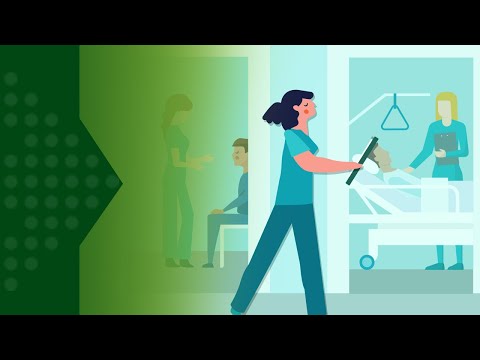A Day in the Life of a Medical Assistant: Skills and Duties
Contents
From checking in patients and updating medical records to scheduling appointments and assisting with minor medical procedures, a medical assistant’s day is varied and busy. Learn about the skills and duties required for this in-demand career.
Checkout this video:
Job description
Medical assistants are multi-skilled health professionals specifically trained to work in outpatient facilities such as medical offices and clinics. Their job description usually entails performing both clinical and administrative duties.
The former mainly involve interaction with patients. They may collect patient medical histories, vital statistics, and information about their insurance coverage. They also record patients’ symptoms, administer tests, prepare samples for laboratory analysis, and instruct patients about medication and special diets. In addition, they may apply dressings, take X-rays, remove sutures, and change electrocardiogram electrodes.
The latter mainly entail office work such as filling out insurance forms, scheduling appointments, update Medical records as well as answering phone calls and emails from patients.
In order to be able to perform their duties effectively, medical assistants must have excellent communication skills, be patient and tactful when dealing with patients, be able to work independently as well as in a team environment, and be detail oriented. They must also have good organizational skills and be able to multitask effectively.
Duties and responsibilities
Most medical assistants have a variety of duties and responsibilities, which may include:
Answering phones
Scheduling appointments
Updating and filing patients’ medical records
Taking and recording patients’ vital signs
Assisting with office procedures, such as administering injections or removing stitches
Collecting and preparing laboratory specimens
Performing basic laboratory tests
Instructing patients about medication and special diets
Maintaining equipment and stocking examination rooms
Filing insurance forms
Making or confirming appointments for patients with specialist physicians
Skills and qualifications
To become a medical assistant, you will need to develop certain skills and qualifications. While some of these skills may be gained through on-the-job training, many medical assistants have formal education and training from vocational schools, community colleges, or four-year universities.
Most medical assistants have at least a high school diploma, although some jobs may require postsecondary education, and most states require certification. In addition to formal education and training, medical assistants should possess certain personal qualities that will help them succeed in this demanding profession.
Medical assistants must be able to handle multiple tasks simultaneously and remain calm under pressure. They must have excellent communication skills and be able to interact effectively with patients, families, physicians, and other members of the health care team. In addition, they must be detail oriented and organized in order to keep accurate patient records and fulfill the administrative duties of the job.
Education and training
Education and training requirements for medical assistants vary by state and employer, but most medical assistants have at least a high school diploma and complete a formal training program. Some states require medical assistants to be licensed or certified.
Medical assistants typically complete a one-year accredited program that leads to a certificate or diploma. Some community colleges offer two-year associate degree programs in medical assisting. These programs typically include classroom, laboratory, and clinical components.
Work schedule
Most medical assistants work full time, and many work evenings or weekends. They typically work in physicians’ offices, hospitals, outpatient centers, and other healthcare facilities. Their work schedule may change depending on the needs of the facility.
Medical assistants typically do the following:
-Schedule patients for appointments and surgeries
-Prepare patients for examinations and take their vital signs, such as blood pressure
-Help collect patient information, such as medical history and insurance data
-Prepare and administer medications as directed by a physician
-Instruct patients on taking medications and follow-up care
Salary and benefits
In addition to a competitive salary, medical assistants may also receive benefits such as paid time off, health insurance and retirement plans. Some employers may also offer incentives such as bonuses or educational opportunities.
Job outlook
Medical assistants are one of the fastest-growing occupations, with a projected 29% growth rate from 2016 to 2026, according to the Bureau of Labor Statistics.** With an aging population and advances in medical technology, the demand for medical assistants is expected to continue to grow.
Medical assistants perform a variety of administrative and clinical tasks to support the work of physicians and other healthcare professionals. They may take medical histories and record vital signs, explain treatment procedures to patients, assist in examinations, prepare patients for x-rays or other diagnostic procedures, give injections, collect and prepare laboratory specimens, perform routine laboratory tests, draw blood, and sterilize instruments.
Pros and cons
Working as a medical assistant has its pros and cons. It is important to be aware of both before making the decision to enter this career field.
PROS
-Can work in a variety of settings (hospital, clinic, doctor’s office, etc.)
-Duties can vary (e.g., patient care, administrative work, assisting with procedures)
-Can specialize in a certain area (e.g., optometry, podiatry, surgery)
-Job growth projected to be much faster than average
CONS
-Can be emotionally demanding
-May have to work long hours, including nights and weekends
-May have to work in more than one location
FAQs
Q: What does a medical assistant do?
A: Medical assistants perform a variety of administrative and clinical tasks to support the work of physicians and other health care professionals.
Q: What are the duties of a medical assistant?
A: The duties of a medical assistant vary depending on the size and type of medical practice. In general, medical assistants perform a variety of administrative and clinical tasks, including scheduling appointments, taking and recording vital signs, drawing blood, preparing patients for examination, and assisting with office procedures.
Q: What skills do you need to be a medical assistant?
A: To be a successful medical assistant, you must have excellent communication skills, both oral and written. You must also be able to work well under pressure, as well as being detail oriented and organized. In addition, you must have basic computer skills and knowledge of Medical Terminology
Tips for success
Becoming a medical assistant is a great way to get started in the healthcare field. Medical assistants perform a variety of administrative and clinical tasks to keep the offices of physicians, podiatrists, and other health practitioners running smoothly. If you’re thinking about becoming a medical assistant, here are a few tips for success.
First, it’s important to have strong communication skills. Medical assistants need to be able to communicate effectively with patients, doctors, and other members of the healthcare team. They also need to be able to understand and follow complex instructions.
Second, medical assistants need to be detail-oriented. They are responsible for maintaining accurate medical records and ensuring that patients receive the correct medications and treatments.
Third, medical assistants need to be able to work well under pressure. They often have to juggle multiple tasks at once and handle last-minute requests from patients or doctors.
Fourth,medical assistants need to be adaptable. The healthcare field is constantly changing, so medical assistants must be able to adjust their workflow as needed.
Finally, it’s important for medical assistants to have a positive attitude. Patients can sense when someone is frazzled or unhappy, so it’s important for medical assistants to project a calm and professional demeanor at all times.







